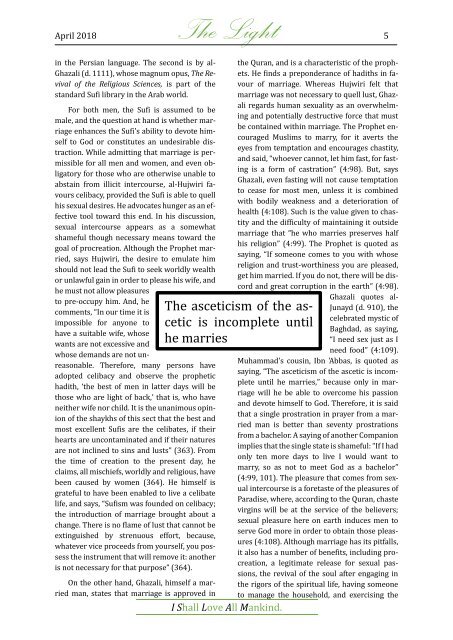The Light April 2018 04
English organ of the Lahore Ahmadiyya Movement. Presenting the Islam taught by the Holy Prophet Muhammad (s) - liberal, inclusive, tolerant, peaceful and rational.
English organ of the Lahore Ahmadiyya Movement. Presenting the Islam taught by the Holy Prophet Muhammad (s) - liberal, inclusive, tolerant, peaceful and rational.
Create successful ePaper yourself
Turn your PDF publications into a flip-book with our unique Google optimized e-Paper software.
<strong>April</strong> <strong>2018</strong> <strong>The</strong><br />
<strong>Light</strong> 5<br />
in the Persian language. <strong>The</strong> second is by al-<br />
Ghazali (d. 1111), whose magnum opus, <strong>The</strong> Revival<br />
of the Religious Sciences, is part of the<br />
standard Sufi library in the Arab world.<br />
For both men, the Sufi is assumed to be<br />
male, and the question at hand is whether marriage<br />
enhances the Sufi's ability to devote himself<br />
to God or constitutes an undesirable distraction.<br />
While admitting that marriage is permissible<br />
for all men and women, and even obligatory<br />
for those who are otherwise unable to<br />
abstain from illicit intercourse, al-Hujwiri favours<br />
celibacy, provided the Sufi is able to quell<br />
his sexual desires. He advocates hunger as an effective<br />
tool toward this end. In his discussion,<br />
sexual intercourse appears as a somewhat<br />
shameful though necessary means toward the<br />
goal of procreation. Although the Prophet married,<br />
says Hujwiri, the desire to emulate him<br />
should not lead the Sufi to seek worldly wealth<br />
or unlawful gain in order to please his wife, and<br />
he must not allow pleasures<br />
to pre-occupy him. And, he<br />
comments, “In our time it is<br />
impossible for anyone to<br />
have a suitable wife, whose<br />
wants are not excessive and<br />
whose demands are not unreasonable.<br />
<strong>The</strong>refore, many persons have<br />
adopted celibacy and observe the prophetic<br />
hadith, ‘the best of men in latter days will be<br />
those who are light of back,’ that is, who have<br />
neither wife nor child. It is the unanimous opinion<br />
of the shaykhs of this sect that the best and<br />
most excellent Sufis are the celibates, if their<br />
hearts are uncontaminated and if their natures<br />
are not inclined to sins and lusts” (363). From<br />
the time of creation to the present day, he<br />
claims, all mischiefs, worldly and religious, have<br />
been caused by women (364). He himself is<br />
grateful to have been enabled to live a celibate<br />
life, and says, “Sufism was founded on celibacy;<br />
the introduction of marriage brought about a<br />
change. <strong>The</strong>re is no flame of lust that cannot be<br />
extinguished by strenuous effort, because,<br />
whatever vice proceeds from yourself, you possess<br />
the instrument that will remove it: another<br />
is not necessary for that purpose” (364).<br />
On the other hand, Ghazali, himself a married<br />
man, states that marriage is approved in<br />
I Shall Love All Mankind.<br />
the Quran, and is a characteristic of the prophets.<br />
He finds a preponderance of hadiths in favour<br />
of marriage. Whereas Hujwiri felt that<br />
marriage was not necessary to quell lust, Ghazali<br />
regards human sexuality as an overwhelming<br />
and potentially destructive force that must<br />
be contained within marriage. <strong>The</strong> Prophet encouraged<br />
Muslims to marry, for it averts the<br />
eyes from temptation and encourages chastity,<br />
and said, “whoever cannot, let him fast, for fasting<br />
is a form of castration” (4:98). But, says<br />
Ghazali, even fasting will not cause temptation<br />
to cease for most men, unless it is combined<br />
with bodily weakness and a deterioration of<br />
health (4:108). Such is the value given to chastity<br />
and the difficulty of maintaining it outside<br />
marriage that “he who marries preserves half<br />
his religion” (4:99). <strong>The</strong> Prophet is quoted as<br />
saying, “If someone comes to you with whose<br />
religion and trust-worthiness you are pleased,<br />
get him married. If you do not, there will be discord<br />
and great corruption in the earth” (4:98).<br />
Ghazali quotes al-<br />
<strong>The</strong> asceticism of the ascetic<br />
is incomplete until<br />
he marries<br />
Junayd (d. 910), the<br />
celebrated mystic of<br />
Baghdad, as saying,<br />
“I need sex just as I<br />
need food” (4:109).<br />
Muhammad's cousin, Ibn 'Abbas, is quoted as<br />
saying, “<strong>The</strong> asceticism of the ascetic is incomplete<br />
until he marries,” because only in marriage<br />
will he be able to overcome his passion<br />
and devote himself to God. <strong>The</strong>refore, it is said<br />
that a single prostration in prayer from a married<br />
man is better than seventy prostrations<br />
from a bachelor. A saying of another Companion<br />
implies that the single state is shameful: “If I had<br />
only ten more days to live I would want to<br />
marry, so as not to meet God as a bachelor”<br />
(4:99, 101). <strong>The</strong> pleasure that comes from sexual<br />
intercourse is a foretaste of the pleasures of<br />
Paradise, where, according to the Quran, chaste<br />
virgins will be at the service of the believers;<br />
sexual pleasure here on earth induces men to<br />
serve God more in order to obtain those pleasures<br />
(4:108). Although marriage has its pitfalls,<br />
it also has a number of benefits, including procreation,<br />
a legitimate release for sexual passions,<br />
the revival of the soul after engaging in<br />
the rigors of the spiritual life, having someone<br />
to manage the household, and exercising the














